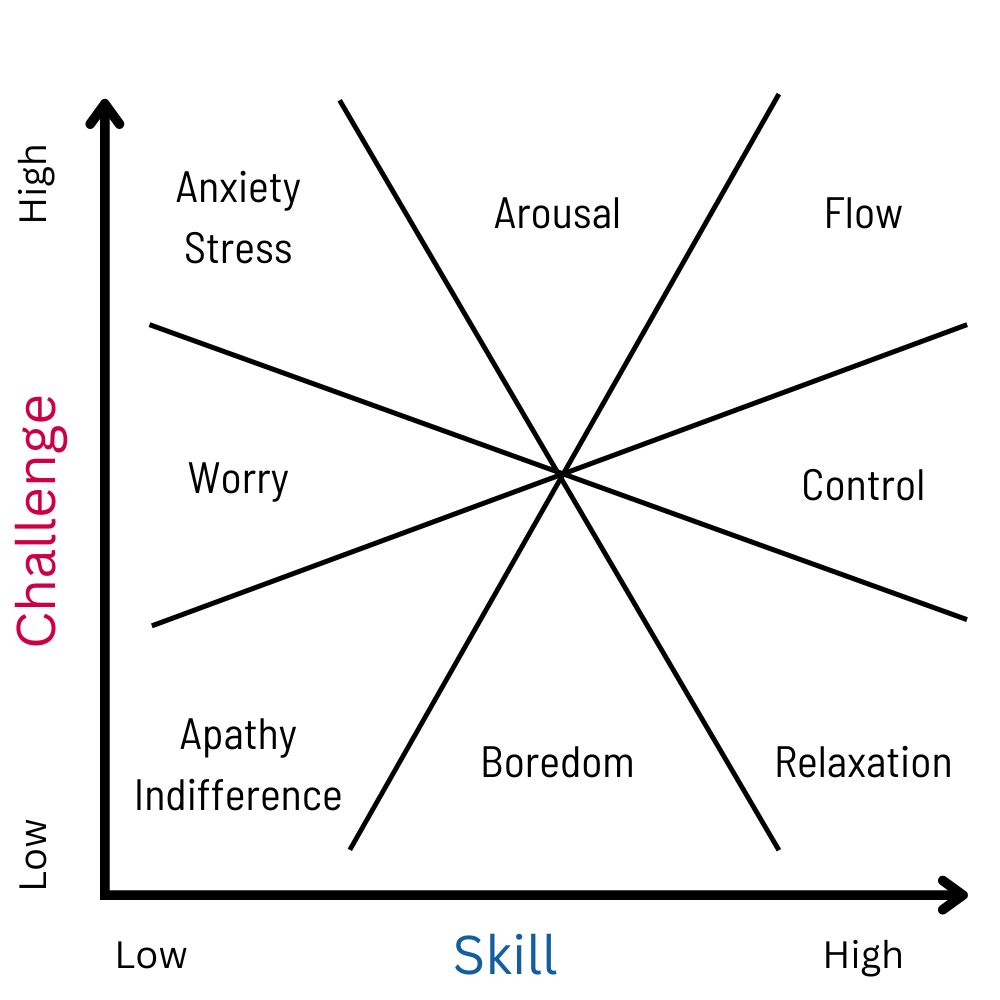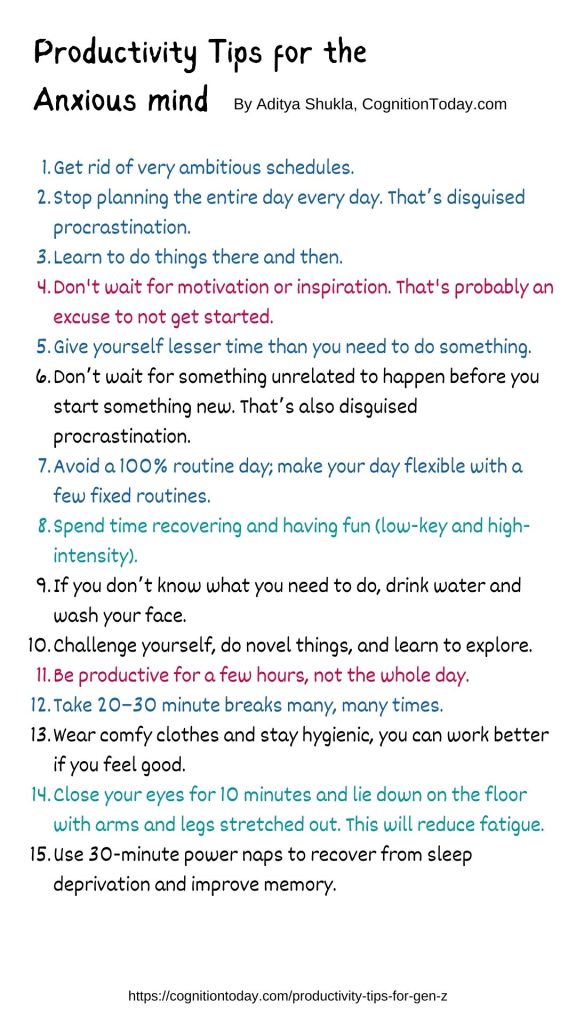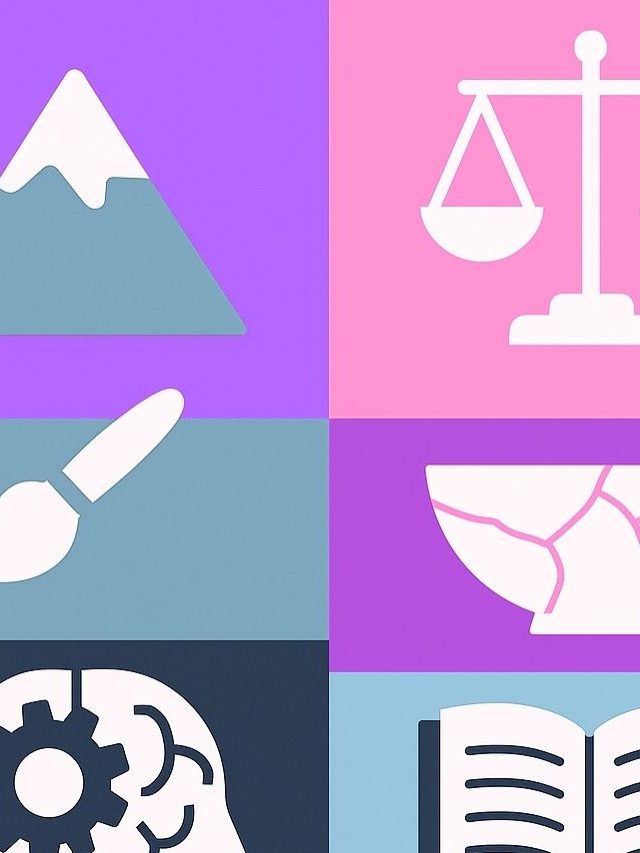Productivity is not about working 24/7; it is living 24/7 with a work-leisure-self balance.
I’ve repurposed some classic “technical” advice on productivity for you – A Gen Z force that values mental health, work-life balance, collaboration and empathy, exponential career growth, self-exploration, and, of course… money. And yes, there are quick fixes for lack of attention and motivation.
This is for your work glow-up. This is at the hygiene (ultra-basic) level.
- Current state of the problem
- 1. Don’t blindly copy the habits of successful people
- 2. You need 2 Types of breaks
- 3. Mental health, always
- 4. Lifestyle hacks for better focus
- 5. Multi-tasking is not bad, but over-tasking is
- 6. Your mood at work depends on your skill level and type of tasks
- 7. Your boss is the reason you can’t manage your time
- 8. Productivity boundaries
- When anxiety is high…
- Takeaway
- Sources
Current state of the problem
Gen Z is making more money, but the increase cannot keep up with living costs and education debt[1]. So to get more out of limited time, which many Gen Zs need for side quests – to manage a side hustle – productivity has to increase. And unfortunately, we are now in a toxic productivity zeitgeist that sacrifices mental health, which leads to bigger problems. And so the cycle continues.
- About 30-35% Gen Z and Millenials are satisfied with their work-life balance (2023[2])
- 77% Gen Z and 75% Millenials in Hybrid or WFH will look for a different job if their employers ask them to be on-site full-time. (2023[3])
- About 32% of Gen Z and Millenials are not comfortable talking about mental health with their managers. (2023[4])
- 46% of Gen Z and 39% of Millenials report feeling anxious and stressed all the time (2023[5])
- Almost 2 in 3 Gen Z and Millenials believe they make a better impression online than offline (2021[6])
- 92% Gen Z multi-tasks while browsing on the internet (2021[7])
- 82% Gen Z wants mental health days off to combat stress and life difficulties (2022[8]), with probable causes being: low affordability[9], lack of healthy, empathetic collaboration, insufficient work boundaries + overworking, and identity merging with work[10]
Of all the people surveyed in the McKinsey American Opportunity Survey (2022), Gen Z and Millenials are unable to perform well at work predominantly because of[11] hostile work environments, rapidly changing job requirements that need new learning, far-from-home job locations, and mental health concerns. Other age groups also lose productivity for these reasons, but the share of 18-34 workers is the largest. And they make up about 40% of the workforce today[12], with much higher numbers in delivery, restaurants, start-ups, tech, IT, services, and hospitality.
This gives us specific criteria for a functional productivity mindset and behavior that looks at mental health, confidence and stress, multi-tasking and WFH-friendliness, and independence/autonomy.
1. Don’t blindly copy the habits of successful people
The problem with adopting the habits of the most productive people is that the habits might have nothing to do with productivity. I am talking about the survivorship bias. For a few people who are successful by developing productive habits, many are unsuccessful despite using the same habits. Only the successful ones write blogs and books on their habits. But the failure stories often have the same habits and productivity insights. So it isn’t useful to blindly copy the habits of productive people. You can read more about the survivorship bias here.
So, the advice is – try a few things, even if they feel unorthodox or unconventional.
2. You need 2 Types of breaks
Everyone needs breaks to maintain the brain’s efficiency, and they don’t always have to be a short vacation after 3 months of slogging. Many who function well with 5 hours of sleep are either on borrowed time, have the luxury to offset the damage it creates, or have a genetic advantage. The idea is to get more work done in less time and then replenish your brain’s resources using breaks and leisure, that is, if you want to sustain the efficiency. So trading off sleep for productivity is unsustainable.
So, you need 2 types of breaks. Some breaks restore the brain and body, and some restore your emotions and meaning in life.
Leisure breaks: Hobbies, social time, vacations, adventure, movies, binge-watching. These breaks typically take money and effort. They make extra-hard work tolerable. These restore emotions and meaning in life.
Recovery breaks: Sleep, exercise, idle time, no calls/texts, screen-free time. These breaks take almost no money and effort. They make the brain capable of braining. These restore your biological functioning.
I personally binge-watch way harder when I get more work done in a day. It restores me for the next day.
One of the things you do for leisure is likely to become your skill. And that might be an opening for a side hustle. Keep your hobbies – they are potential openings for more money, and they protect mental and cognitive health.[13]
3. Mental health, always
Bad mental health often destroys productivity. But this is a very nuanced story. Check this article for the details, but here’s a summary.
- Burnout, anxiety and confidence problems, and depression are the 3 primary reasons poor mental health worsens productivity. These have 2 byproducts – lack of meaning and purpose at work, and feeling unable to meet work demands.
- Being in a team that has high expectations (without exploitation) and self-hyping can raise the quality of work.
- Adequate sleep fixes many problems and improves mental health. Prioritize it. The alternative is constantly losing focus, critical thinking, and memory.
Since your main concern about mental health is likely to be a lack of access to services and a lack of opportunity to take mental health days off, I’ve recommended some techniques that can help at work. You can try mental health apps or a DIY approach too.
4. Lifestyle hacks for better focus
One thing every survey somehow leaves out is asking about your ability to focus and the narrative about your attention span. So here’s what I’ve observed, which is contrary to the idea that attention span as a mental skill is declining. Attention spans don’t reduce because attention is task-dependent. If the tasks rapidly change, the brain enters a state of shifting attention quickly. If there is a perceived threat and constant stress, focus drops. If there are intrusive thoughts, attention drops. If work complexity increases, attention has to shift. If work gets too boring, the brain entertains itself by producing random thoughts that steal attention. This does not mean you have ADHD and are doomed to not have focus.
It is worth maximizing your potential to concentrate first. Here’s how.
- Sleep well, sleep enough, and take breaks. Brain functions depend a lot on the quality and quantity of sleep and breaks restore attention.
- Stay hydrated[14], eat well[15], and do some coordination-based exercise[16] and aerobics[17]. If you are dehydrated, lethargic, and haven’t consumed food, your concentration will drop. The brain demands a lot of resources (glucose, oxygen, calcium, etc.) at the chemical level. Keep your body healthy to allow the brain to consume those resources.
- Work on mental health, avoid boredom, and partake in some meaningful stimulating work that engages your brain and body. Emotional states affect overall attention[18], and they may decrease your ability to concentrate.
- Take enough healthy breaks for your brain to digest past learning and replenish resources for a burst of concentration. A work break to watch cute photos of animals is a known way to boost concentration by increasing careful behavior and narrowing attention (= sharp focus).
- When you choose to concentrate, find a way to stay engaged, curious, and have fun because these mental states supply more cognitive resources that are specifically relevant to what you are processing. Gamify. Interact. Create. Be active, not passive.
- Play games for fun to train your brain. Video games[19] can improve concentration because games often demand it, and we end up practicing our focusing ability. They also become a good break to reset the mind.
- Practice mindfulness, meditation, or yoga[20] to improve cognitive functioning and baseline concentration level.
- Coffee, Green Tea & Matcha Tea[21] enhance attention. So does chewing gum.
- Go out into nature to improve overall well-being and work-life productivity. Doing so helps our brain reset the emotional chaos that disrupts attention. And if you can’t find nature outside, bring nature to you – plants, greenery, wind. And if that doesn’t work, simulate nature with sounds.
Related: Losing Hope? Find waypower and willpower.
5. Multi-tasking is not bad, but over-tasking is
Doing things in parallel improves motivation and efficiency if at least one of the tasks is very boring or automatic. 2 cognitively demanding tasks back to back or in parallel will fatigue the brain.
The real problem is over-tasking, which is taking on too much on your plate at a time because emotions are saying you can. Emotions don’t always remain the same as the tasks progress, and this changes your efficiency and motivation.
Decision criteria to multi-task, all validated with published research. Source: Don’t just trust me bro.
Multitask if:
- At least 1 task is boring or repetitive.
- At least 1 task is demotivating.
- Light music or music that puts you in flow is your 2nd task
- You are prone to making errors if you keep zoning out.
- Your parallel task is light browsing, light chatting, light co-working.
Don’t multitask if:
- Both tasks require high attention.
- Both tasks interfere with each other because both are text-based or both are numerical or both are visual design.
- Both tasks are novel or very difficult.
The rules apply to most, but exceptions exist.
6. Your mood at work depends on your skill level and type of tasks
Consider only 2 variables. The difficulty of your task and your overall skills to handle the task. Researchers have shown that the 2 variables create 8 different moods, including feeling flow, excitement, stress, and boredom. They alter your motivation and enthusiasm at work, assuming everything else is manageable. Here’s the chart.

Considering the rapidly changing AI-based universe, the challenge will change rapidly, regardless of the difficulty. But since it changes, your brain will think of it as new and difficult. So the only solution is to get hands-on and learn everything new that is happening. The people who typically pay (much older employees) will need you to do a lot of the new work, which feels more natural to you because you are a digital native.
And if the work is not challenging or unstimulating, you have options like over-delivering, multi-tasking with music and lite tasks, or moonlighting for a side hustle.
7. Your boss is the reason you can’t manage your time
Let’s be real: if rating systems weren’t rigged to make a company look good (I’m looking at you NPS rating), a wave of 2/10 and 3/10 will ensure many bosses pick up their game. But since that can’t be easily changed, I’d like to share 1 simple time-management principle – Parkinson’s law. Use it when your boss gives odd deadlines or delays a response which ends up wasting your time.
The Parkinson’s Law[22] states that “work expands so as to fill time available for its completion” (Cyril Northcote Parkinson, 1955); this means the more time you allow yourself to complete a task, the longer it will take. While many say this is just an adage, it does have empirical support[23] (more here[24]).
For example, if your boss gives you 1 week to complete a task that will otherwise take 4 hours to complete, you will take about a week to complete that task instead of completing it within 4 hours. This is also why students never get to completing their assignments until the very last minute.
Along with the extra time to complete the given task, it may also increase the stress or pressure of completing a task. Not allowing yourself to have excess time to complete a task may help you not waste time and be more productive. As a rule of thumb, prepone your deadlines by half the total time you were ok with.
Related: Why your managers suck a their jobs
8. Productivity boundaries
It’s clear you are willing to learn and adapt to existing work cultures, but at some point, that’s a problem. Some things are better done with text. Some are better with email. Some are better with phone calls.
WFH and hybrid work is like having an identity crisis – are you working 24/7? Are you your job? These problems vanish with boundaries. I recommend 4 core boundaries you have to set, so you can continue working at your best.
- Strong limits on what hours you will not work and not take calls/requests.
- High priority for things in your self-interest (especially if you are not validated or acknowledged, leading to low confidence).
- Physical movement and breaks to define a “block” of work.
- Assertiveness to say when you can or cannot provide something.
When anxiety is high…

Takeaway
- Protect mental health. Periodt.
- Your focus depends on lifestyle choices that deplete or restore attention, breaks, and emotions.
- Multi-task and moonlight if you have to.
- Improve skills to match work challenges or challenge yourself more in case of boredom.
- Set boundaries on work interactions and work commitments.
Sources
[2]: https://www.deloitte.com/global/en/issues/work/content/genzmillennialsurvey.html
[3]: https://www.deloitte.com/global/en/issues/work/content/genzmillennialsurvey.html
[4]: https://www.deloitte.com/global/en/issues/work/content/genzmillennialsurvey.html
[5]: https://www.deloitte.com/global/en/issues/work/content/genzmillennialsurvey.html
[6]: https://newsroom.squarespace.com/blog/squarespace-survey-reveals-genz
[7]: https://newsroom.squarespace.com/blog/squarespace-survey-reveals-genz
[8]: https://www.talentlms.com/research/gen-z-workplace-statistics#great-place-to-work
[9]: https://go.gale.com/ps/i.do?id=GALE%7CA762989934&sid=googleScholar&v=2.1&it=r&linkaccess=abs&issn=00125245&p=AONE&sw=w&userGroupName=anon%7E884ca6e8&aty=open-web-entry
[10]: https://www.deloittedigital.com/us/en/blog-list/2023/gen-z-research-report.html
[11]: https://www.mckinsey.com/featured-insights/sustainable-inclusive-growth/future-of-america/how-does-gen-z-see-its-place-in-the-working-world-with-trepidation
[12]: https://www.pwc.com/ug/en/press-room/how-prepared-are-employers-for-generation-z-.html
[13]: https://www.emerald.com/insight/content/doi/10.1108/MHSI-06-2021-0033/full/html
[14]: https://www.cambridge.org/core/journals/british-journal-of-nutrition/article/effects-of-hydration-status-on-cognitive-performance-and-mood/1210B6BE585E03C71A299C52B51B22F7
[15]: https://www.cambridge.org/core/journals/nutrition-research-reviews/article/nutritional-influences-on-cognitive-function-mechanisms-of-susceptibility/C362C6A3D5B12BE7CB13C82C974B1FFE
[16]: https://www.sciencedirect.com/science/article/abs/pii/S0304394008008483
[17]: https://www.ncbi.nlm.nih.gov/pmc/articles/PMC2897704/
[18]: https://www.tandfonline.com/doi/full/10.1080/02699930903378305?src=recsys
[19]: https://www.ncbi.nlm.nih.gov/pmc/articles/PMC5438999/
[20]: https://www.ncbi.nlm.nih.gov/pmc/articles/PMC2997234/
[21]: https://www.ncbi.nlm.nih.gov/pubmed/28056735
[22]: https://www.sciencedirect.com/science/article/abs/pii/0022103167900297?via%3Dihub
[23]: https://link.springer.com/article/10.3758/BF03210823
[24]: https://psyarxiv.com/3uk2b/

Hey! Thank you for reading; hope you enjoyed the article. I run Cognition Today to capture some of the most fascinating mechanisms that guide our lives. My content here is referenced and featured in NY Times, Forbes, CNET, and Entrepreneur, and many other books & research papers.
I’m am a psychology SME consultant in EdTech with a focus on AI cognition and Behavioral Engineering. I’m affiliated to myelin, an EdTech company in India as well.
I’ve studied at NIMHANS Bangalore (positive psychology), Savitribai Phule Pune University (clinical psychology), Fergusson College (BA psych), and affiliated with IIM Ahmedabad (marketing psychology). I’m currently studying Korean at Seoul National University.
I’m based in Pune, India but living in Seoul, S. Korea. Love Sci-fi, horror media; Love rock, metal, synthwave, and K-pop music; can’t whistle; can play 2 guitars at a time.



























